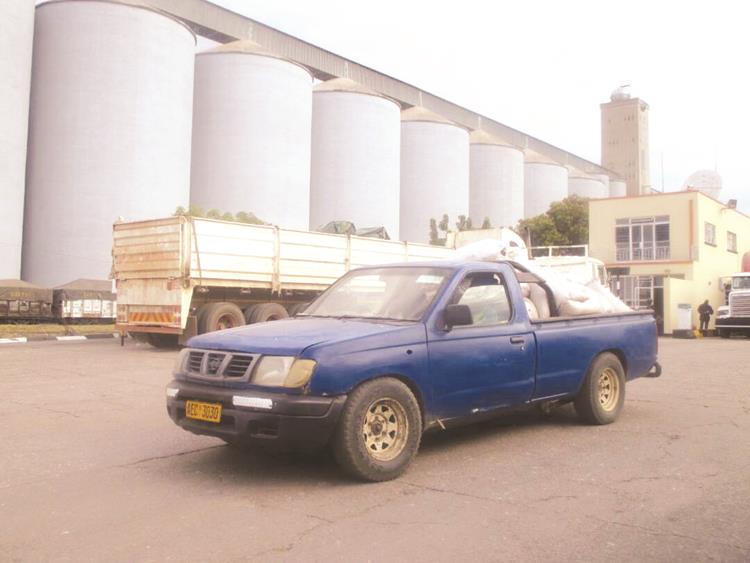‘Command Agriculture puts doubters to shame’


A farmer drives out of GMB Lion’s Den Depot after his grain was rejected for having high moisture content. Farmers end up selling the grain to unscrupulous middlemen outside the depot. — (Picture by Walter Nyamukondiwa)
Samuel Kadungure Manicaland Bureau—
THE Command Agriculture experience has proven that Zimbabwean farmers have immense capacity to increase production to meet long-term adequacy of food for both domestic purposes and exports. The observation was made by Wing Commander Emson Kujinga, the Commandant of the Air Force of Zimbabwe (Manyame) School of Academic and Staff Training after an educational tour —with 33 trainees — among them seven students from Namibia, Malawi and Zambia at Mhandara Farm in Headlands last Saturday, to assess benefits accruing from the agrarian reform and Command Agriculture vis-a-vis the attainment of targets set in the Zim-Asset food security cluster.
Also read:
- Bumper harvest: The ball is in GMB’s court
- ‘Arrest middlemen buying maize cheap’
- EDITORIAL COMMENT: Punish Command Agric saboteurs
- Cash-rich middlemen rip off farmers
- Mnangagwa reprimands Moyo on Command Agriculture
- Prof Moyo statement on Command Agriculture
- Moyo admits benefiting from Command Agric
- Command Agric funds accounted for: Mushohwe
- Govt clears air on Command expenses
- Analysts slate Moyo over Command Agric attacks
- EDITORIAL COMMENT: Command Agric, STEM, sides of same coin
- 19 600 farmers receive Command Agric inputs
- Editorial Comment: Food security; everyone’s responsibility
- Allocations along Zim-Asset lines hailed
- Govt to sign $25m agric pact
Wing Comm Kujinga said the programme had reinvigorated the economic viability of agriculture in the country and should not be a once-off event, but be rolled on until farmers satisfy the local and export food and feed needs. He said the security sector had a keen interest in food security issues because hunger was a national security threat.
“A hungry man is an angry man, and as members of the security establishment, we are interested in food security matters because when the majority don’t have enough to eat, it has the possibility of fomenting unrest in the country. When there is unrest in the country, one of our goals as the military is to support civil authorities with military power.
“We are happy if enough food is being produced because it means the populace will be satisfied as far as food is concerned and there will not be any restlessness, uprising or violence. We won’t be called to stabilise the situation. So we are happy when there is productivity on the farms as it ensures food for the people, peace and security in the country,” said Wing Comm Kujinga.
“We recommend that, unlike the traditional way of farming that relies on natural rains, we develop our irrigation capacity so that we can irrigate and produce crops all year round. There is also need for on-farm produce beneficiation so that the farmer accrues maximum benefits,” he added.
He said both foreign and local students had benefited immensely from educational tours across the country.
“The locals are young students who were not really involved in the land reform, so we want them to have a hands-on appreciation of what is on the ground. We are also exposing foreign students to what is actually taking place at the farms so that they can judge for themselves and compare what they see for themselves and what they hear from the media. There is a lot of negative publicity with regards to the land reform programme. The media paints the land reform of Zimbabwe as a failure, but from the visit they have seen for themselves, not only the benefits that have accrued, but also benefits that will come in the form of food security,” said Wing Comm Kujinga.
The students also hailed the Command Agriculture programme, saying it is plugging the gaps in the agrarian reform.
They hailed both the agrarian reform and Command Agriculture and called for exchange programmes with their respective countries.
“After getting the land, we wanted to see how it was being used and to prove a point that the land (in Zimbabwe) is not dormant. We have seen that Mr Mapuranga, who has over 300ha, has really invested in the land,” said Major Tina Malungu of Zambia Air Force.
“Zimbabwe is looking into the future by investing in dams, irrigation, and Command Agriculture. Zambians should appreciate land like what Zimbabweans do. Most of the land in my country is dormant as farmers don’t appreciate it and when I go back I will help my country to invest in the land. From what I have seen, Zimbabwe’s land reform programme was justified,” she said.
Flight Lieutenant Shilongo Elifas of Namibia Air Force, said by involving youths in farming, Zimbabwe was being futuristic.
“Back home when we talk of farming, it is mostly about the older generation, but here in Zimbabwe you fuse youths with experience. We have a lot of underutilised land back home, and for our youths, it will be a good idea if they also start engaging in food production and farming because we are missing out by thinking that farming is for the old or retired generation.
“The land that was taken is being utilised and I don’t see anything wrong with the change of ownership of the land,” said Flt Lt Elifas.
Mr Dakarai Mapuranga, who owns Mhandara Farm, ventures into potato, maize, seed potato, wheat and sugar beans farming, planted 100ha of maize under Command Agriculture.
He has harvested about 20ha, getting between nine to 12 tonnes per hectare of long season variety and between eight and nine and half tonnes per hectare of short season variety.
Mr Mapuranga urged all farmers assisted with inputs to deliver their crop to GMB.
“If we side market and don’t deliver to GMB, the programme might not be sustainable. We have to pay all that we borrowed to ensure sustainability of the programme,” said Mr Mapuranga.









Comments